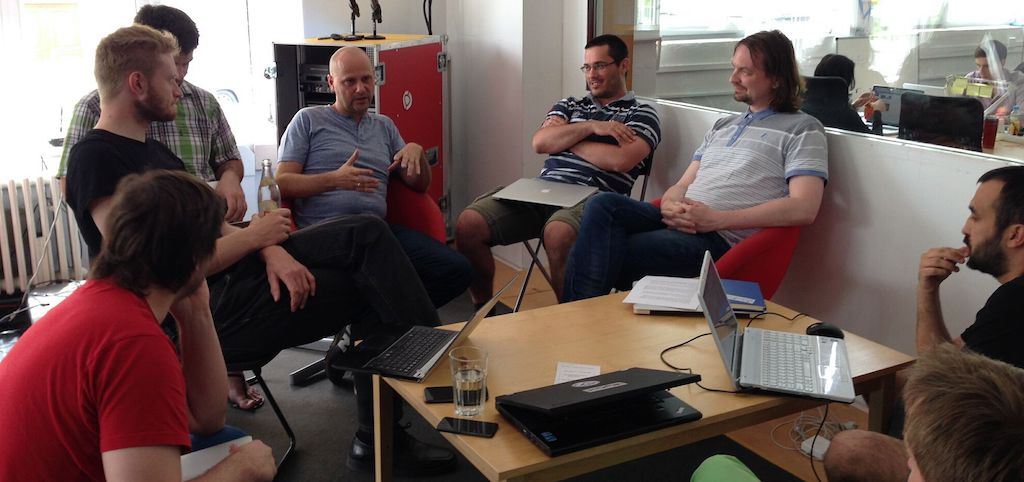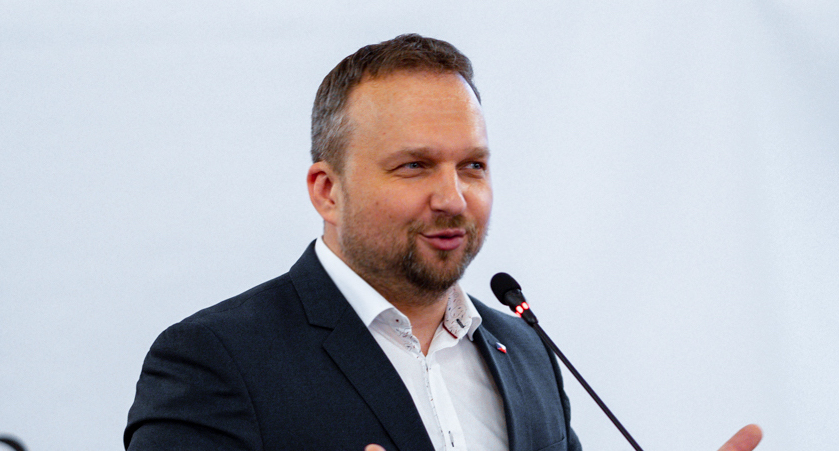 Michal Pěchouček, Chairman of the Executive Board of prg.ai
Michal Pěchouček, Chairman of the Executive Board of prg.ai
Can you briefly introduce us to prg.ai?
prg.ai was founded in 2019 by academics from the Czech Technical University, Charles University, and the Czech Academy of Sciences, with a significant contribution provided by the City of Prague. This synergy of human and institutional resources is driven by the ambition to make full use of local potential and transform Prague into a European centre of artificial intelligence.
We support talent and business, strengthen the relations between research and application, promote the local ecosystem abroad, and enlighten the public on the benefits and risks of artificial intelligence. As a non-profit initiative, we strive for a prosperous innovation environment, thereby contributing to Czech economic and social development.
Our actions and projects contribute to building, developing, and interconnecting such an innovation ecosystem.
Could you present the Prague AI scene and the perspectives of its development?
The field of artificial intelligence is already firmly established on the Prague academic scene. The Czech Technical University and Charles University both offer first-class AI education, enabling their graduates to rank among the world’s best in sub-fields such as computer vision, robotics, or natural language processing.
Articles authored by researchers at these universities have been published in prestigious scientific journals, and their breakthrough findings improve the functionality of Google Translate, Spotify, or Amazon Alexa. Even the Falcon 9 Rocket by SpaceX is learning to land with the help of Czech experts on artificial intelligence.
Access to such industry leaders provides students with the opportunity to participate in research projects alongside trailblazing companies or to take part in prestigious international competitions. In conjunction with quality teaching, such experience enables them to develop a promising career in industry and research, at home or abroad.
Thanks to the excellent academic environment in Prague, dozens of successful companies have sprung up here and their AI-powered products and services are celebrated around the world. In addition, several industry giants such as Cisco, H2O.ai, and Honeywell have established their research departments here.
AI is expected to contribute in hundreds trillions of US Dollars to global GDP. For Czechia to play a significant role in the new economy, we need innovative companies and startups that develop products and services reaching far beyond our country’s borders. What’s more, we need well-established companies successfully implementing innovation in real-life use cases.
Could you give us an idea how important is the AI related business sector for the economy?
As mentioned previously, the vision of our association aims to turn Prague into a European centre of artificial intelligence. To achieve this goal, however, we lacked a comprehensive analysis of the private sector, which plays a crucial role in Prague’s AI ecosystem. Therefore, we decided to map the local AI company landscape, get to know the relevant players and gain insight into the size of the local market and its mechanics. The result of our work is the first ever study of its kind, which we decided to publish in a comprehensive form that is accessible to industry professionals, journalists and the public alike, titled Mapping of the Prague AI company scene.
The first part of the report summarizes main results of a survey we conducted from January to June 2021 among 130 companies. We worked with a representative sample that included small, medium and large Czech product and consulting companies operating in Prague as well as foreign entities with research and development capabilities in Prague.
We were interested in what technologies Prague AI companies use to develop products and services, how these companies are funded, what sectors and countries their products serve, and how they recruit employees for their technical teams. Yet the survey also included an opinion question about what could be the key to making Prague a European leader in AI.
And some of the key findings? A typical Prague AI company is young, self-sufficient and export-oriented. Main product or service domains are machine learning, natural language processing and machine perception (incl. computer vision). Key markets are EU and North America and key industries served financial services, ICT, retail and e-commerce, healthcare and manufacturing.
On over 50 pages readers will also find articles, interviews and overviews that
complement and expand on the themes emerging from our data collection. Industry members of prg.ai such as Avast, DataSentics, Resistant AI and Rossum have contributed articles to the study on topics ranging from the importance of data and AI strategy for customers, to tips for successfully adopting AI solutions for business and building a world-class product powered by machine learning. This mosaic of thought-provoking and inspirational information was illustrated by companies such as Ataccama, Deepnote and Semantic Visions, which have helped raise Prague’s profile on the world stage.
We devoted an entire special section to the status of women in science and across the private sector — according to the World Economic Forum 2020 report, women make up only 26 percent of the data and AI workforce, while the prg.ai survey showed that their share in Prague-based companies is even lower. Throughout the report, we therefore introduce a promising female scientist, an accomplished developer, and startup director, as well as the experience of inclusive employers.
The study is rounded off with an overview of the main achievements and successes Prague saw in 2021, focusing specifically on educational and research institutions which play an indispensable role in the development of the local innovation ecosystem.
What are the major challenges for prg.ai and members in the national and international area in the world of today and tomorrow?
Czechs are challengers of the AI world. We have excellent universities and talented people, and we can solve business problems, whatever the industry. But to make a real impact, we need to raise awareness in the EU and worldwide. Almost one third of Prague based companies generate 90 % or more of their ML/AI revenues outside of the Czech market – that seems to be a good start.
The key to growth is to educate more people in AI skills. Once there are more experts, there will be more AI activities, more AI startups, and more practical uses
of AI across industries. SMEs are crucial. If they start using AI solutions and finding value in them, then the industry will boom worldwide. It is important to improve the flow of ideas and solutions from academia to successful businesses and startups.
The technical talent in the Czech Republic is outstanding. We should make sure that this talent stays here and has opportunities for growth. However, we should hone our entrepreneurial mindset — people should set up companies and not just get employed by corporations.
We also need to attract international talent. Easy to say, hard to do. We should be more open as a society, implement a fast-track immigration process for experts, simplify administration related to company creation, and streamline stock-option plans for Czech legal entities.
Michal Pěchouček, Chairman of the Executive Board of prg.ai


















